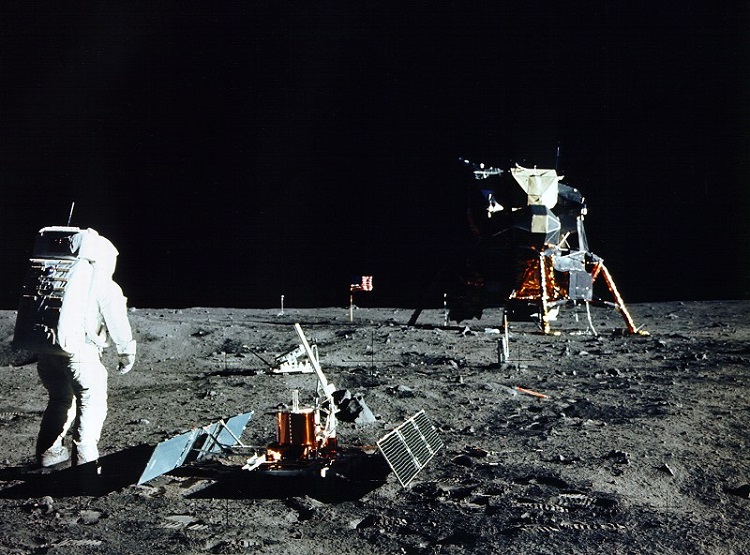
|
|

|
|
| April 25, 2024 |
|
50 years later, Apollo 11 moon landing reminds America what it's capable of 
Fifty years ago today humanity set foot on the surface of another world for the first time.
Those hopping steps by Apollo 11 astronauts Neil Armstrong and Buzz Aldrin left lasting marks on the lunar surface and a legacy here on Earth that's similarly indelible. There's the technology, of course. The long list of Apollo spinoffs includes space blankets, improved food-safety procedures and computer-guided flight, an innovation that soon found its way into airliners and, later, cars (in features such as cruise control and antilock brakes). But the biggest and most important impacts of Apollo are less tangible. For example, the giant leap gave Americans a glimpse of their nation's true potential. Apollo 11 showed that "when we have the political will to do something grand, and we set ourselves an achievable goal — even though it's challenging — the country can come together and do something of magnificent quality," said John Logsdon, a professor emeritus of political science and international affairs at George Washington University's Elliott School of International Affairs in Washington, D.C. To appreciate the scope of the Apollo 11 accomplishment, consider where NASA stood at the start of the moon rush. President John F. Kennedy announced on May 25, 1961, that the United States would put a man on the moon, and bring him safely home, by the end of the decade. At the time, the United States had just 15 minutes of human-spaceflight experience — the suborbital flight of Alan Shepard, which had occurred three weeks earlier, on May 5. Yet NASA pulled off JFK's bold vision in a mere eight years. And this giant leap took place just 12 years into the space age, which dawned when the Soviet Union launched the satellite Sputnik 1 on Oct. 4, 1957. The Soviets notched other early firsts — most famously, launching Yuri Gagarin to Earth orbit on April 12, 1961. These achievements shook American officials, who devised the moon goal in response. "The Apollo days were not, fundamentally, about going to the moon," Logsdon told Space.com. "They were about demonstrating American global leadership in a zero-sum Cold War competition with the Soviet Union." And that brings us to another one of Apollo 11's most important legacies — establishing the United States' scientific and technological prowess. The lunar landing helped convince countries around the world that the future belonged to the capitalist superpower rather than the communist one, said Roger Launius, who served as NASA's chief historian from 1990 to 2002 and wrote the recently published book "Apollo's Legacy" (Smithsonian Books, 2019). "It swayed to the American side of the equation a number of nations, including those that were not aligned at the time — especially emerging nations that had gained their independence after World War II," Launius told Space.com, citing India as a key example. "And that was really critical." If the Soviets had been the first to put boots on the moon — and the nation did try, building a giant moon rocket that never launched successfully — the Cold War might not have ended the way it did, Launius added. Other aspects of Apollo 11's legacy remain amorphous even five decades later. For example, in 1999, historian Arthur Schlesinger Jr. called the first moon landing the most important event of the 20th century, because it marked our species' first true foray away from its home planet. But Schlesinger was imagining a future in which humanity makes many more giant leaps into the final frontier, each one more ambitious than the last. And we don't yet know if this vision will come to pass, Logsdon said. "I think it's still an open-ended sort of thing: Are we going to take the next steps or not?" Logsdon said. "If indeed it was the first step in a long-term, centuries-long program of human expansion, then it will be historically one of the most important things that has ever happened. But it's not clear that that follow-up is going to happen." The next steps, as NASA sees them, include a crewed lunar return just five years from now. The agency plans to put two astronauts down near the moon's south pole by 2024, as part of an exploration program called Artemis. Story Date: July 22, 2019
|